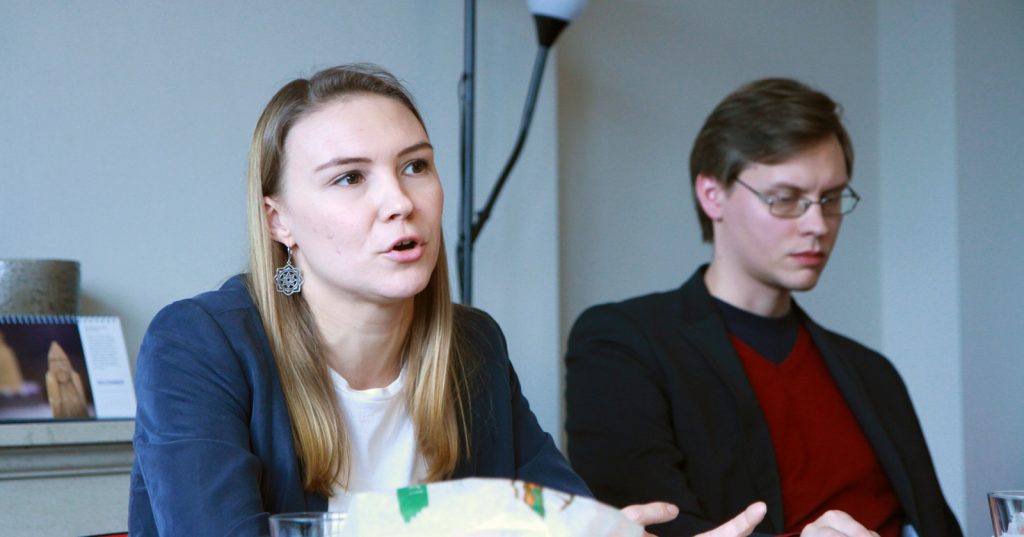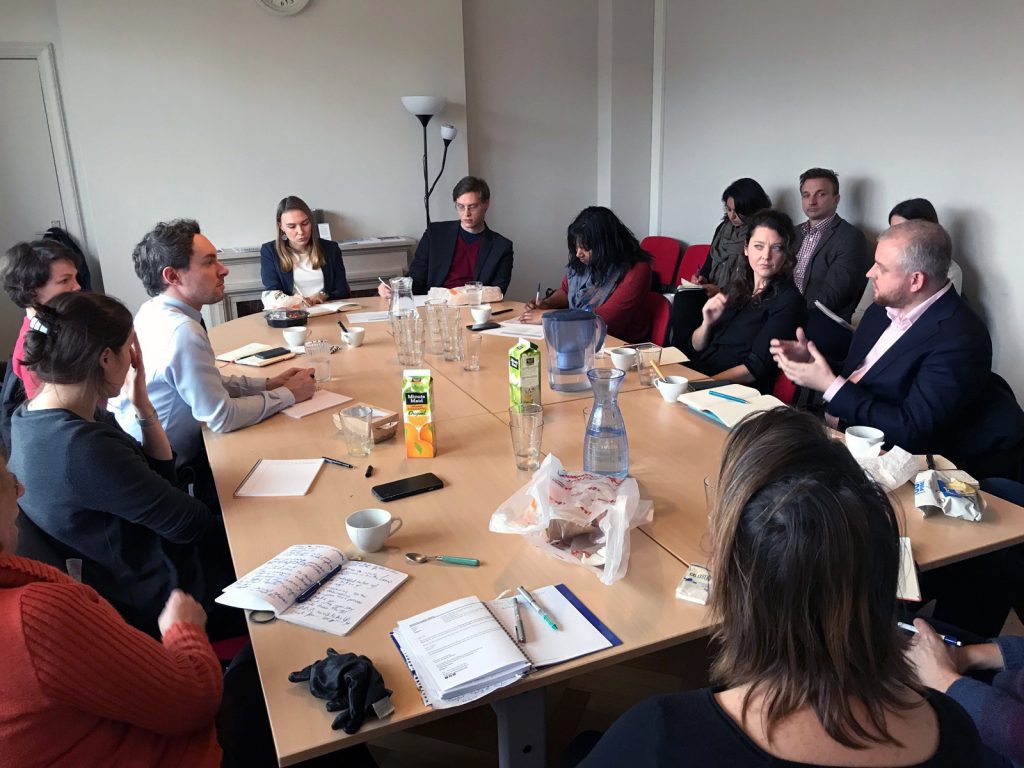A critical friend helps CMI to clarify its strengths
In applying a new evaluation approach in the field of peacemaking – the Critical Friend approach – CMI has improved its programming and strengths as one of the world’s leading peace mediation organisations. Between 2016 and 2017, an independent expert serving as a “critical friend” supported CMI in learning from the past and building our new strategy and programme. For example, the critical friend contributed to strengthening the promotion of women’s role in peacemaking as a strategic priority of CMI’s work.

CMI’s Laura Salonen and Mikko Patokallio emphasize that the critical friend method is useful especially in terms of learning.
CMI analyst Mikko Patokallio and programme management officer Laura Salonen presented the critical friend method and its results to a group of peer organisations at a lunch event in Brussels on 19 December. The event was organised by the European Peacebuilding Liaison Office (EPLO).
Critical friends are quite commonly used in the field of education, for example. CMI decided to apply this evaluation method to the field of peacemaking, hoping to benefit from its emphasis on improved learning and link to improving practice.
In 2016, CMI invited Dr Eleanor O’Gorman to act as its critical friend. O’Gorman has lengthy experience in the field of conflict resolution. She supported CMI leadership in reflecting on the changing trends within mediation, and in articulating CMI’s added value in its work in conflict resolution for improved programming in the future direction of its work. She accompanied CMI from November 2016 until June 2017 through a series of internal meetings, consultations and events as well as by providing specific analysis on key aspects.
As Critical Friend, O’Gorman evaluated CMI’s previous programme for 2014-2016. The combined learning and evaluation of the past work contributed to the development of CMI’s new strategy and programme for the period of 2018-2021. Overall, the Critical Friend experience was very positive for CMI.
”We were able to get a clearer picture of our niche and added value. The question was, how could we better make a difference in the world?,” Salonen says.
O’Gorman’s contribution is most visible in the greater emphasis in two areas of CMI’s work, namely women in peacemaking and policy and learning, given in the new CMI programme. Supporting women’s role in creating more sustainable peace processes is now clearly articulated as a strategic priority. Through a new focus on policy and learning, CMI aims to contribute to developing the field of peace mediation in the international community so as to better address the challenges presented by complex conflicts.

CMI’s peer organisations showed a keen interest in the critical friend method at a lunch event in Brussels.
“Learning was the precious glue holding everything altogether”
Patokallio highlighted the usefulness of the critical friend method by comparing it to more traditional ways of carrying out evaluations in the field of peacemaking. Evaluations are normally a long process, and by the time they are done their findings may no longer be as directly applicable for the organisation being evaluated.
“The traditional evaluation instruments are not the best for organisations when it comes to the need to learn from their own failures and success,” said Patokallio.
By contrast, the critical friend process is an iterative process that builds from one stage to the next. As O’Gorman was able to deliberate continuously with CMI’s staff, the focus on the process could be changed to meet new needs as they arose, from strategic, programmatic to organizational. This is why the method is useful especially in terms of learning that feeds into improved practice.
“If you actually want to improve something, you will need to be able to learn in real time. You don’t want to have to wait to learn until after the evaluation is done. Learning was the glue that was very, very valuable for us. It’s a question of how we could be better in doing what we do tomorrow and in the future years,” summarised Patokallio.
Many of the participants in the lunch events were interested in learning how to select the right critical friend. Patokallio emphasised that critical friend is a very personality driven process.
“The person has to be an expert who knows the field but who is also independent. However, you can find a lot of different people who can meet this criterion. You have to have the feel of what kind of person this is. Different kinds of critical friends will give you different kinds of results.”
For CMI, O’Gorman was able to build the trust that was needed to derive insight.
“Even though this was an evaluation, the people at CMI didn’t feel like they were being evaluated. That reflects the trust between us and our critical friend. This allowed a very frank and constructive assessment of reality,” said Salonen.